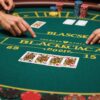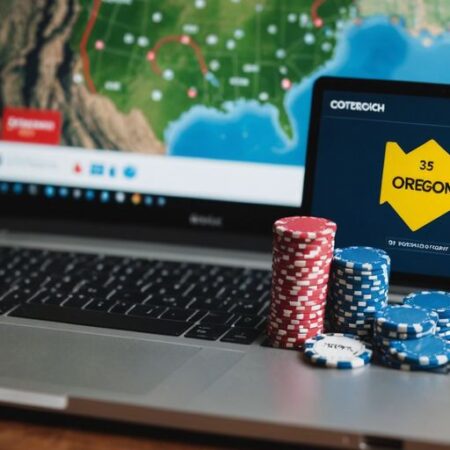Poker is not just a game of chance; it’s a game of strategy and skill that can help you in many real-life situations. Whether you’re calculating odds, making quick decisions, or reading people, the skills you develop in poker can be very useful. This article explores how playing poker can help you become better at quantitative analysis, commonly known as quant.
Key Takeaways
- Poker improves your critical thinking and analytical skills, which are essential for quantitative analysis.
- Understanding odds and probabilities in poker can enhance your ability to work with statistics and probabilities in quant.
- The decision-making skills you gain from poker can help you make better choices under pressure in real-world scenarios.
- Playing poker helps you develop emotional control and patience, both of which are important for long-term success in any field.
- The strategic thinking and risk management skills you learn in poker are directly applicable to financial decision-making and planning.
Cognitive Skills Enhanced by Poker
Critical Thinking and Analysis
Playing poker requires players to constantly evaluate their hands, the community cards, and their opponents’ potential hands. This process sharpens critical thinking and analytical skills. Players must make quick decisions based on incomplete information, which helps in developing a more comprehensive understanding of various situations.
Probability and Statistics
Poker is a game deeply rooted in probability and statistics. Players need to calculate the odds of winning a hand, which involves understanding and applying statistical concepts. This practice enhances their ability to work with numbers and improves their overall mathematical skills.
Decision Making Under Pressure
In poker, players often face high-stakes decisions that must be made quickly. This environment helps players improve their decision-making skills under pressure. They learn to stay calm and make rational choices even when the stakes are high, which is a valuable skill in many real-world situations.
Incorporating psychological insights into poker strategy can enhance a player’s performance. Players can develop a more comprehensive understanding of the game.
Mathematical Concepts in Poker
Understanding Odds and Probabilities
Poker is fundamentally a game of mathematics. Players must understand the odds and probabilities of different hands to make informed decisions. For example, knowing the probability of hitting a flush or a straight can help a player decide whether to call or fold. Every decision in poker can be expressed in terms of mathematical probabilities, dismissing the notion of “luck.”
Expected Value Calculations
Expected value (EV) is a key concept in poker. It helps players determine the long-term value of a particular decision. By calculating the EV, players can decide whether a bet, call, or fold will be profitable in the long run. This involves considering all possible outcomes and their probabilities.
Game Theory Applications
Game theory plays a significant role in poker strategy. Players use game theory to make decisions that are not easily exploitable by opponents. This involves balancing bluffs and value bets to keep opponents guessing. Understanding game theory helps players develop a more robust and unpredictable strategy.
Psychological Benefits of Playing Poker
Emotional Regulation
Playing poker can significantly enhance your ability to manage emotions. Staying calm under pressure is crucial in poker, as emotional decisions can lead to costly mistakes. This skill translates well into real-life situations where maintaining composure is essential.
Reading Opponents
Poker requires you to read your opponents’ behaviors and predict their moves. This involves paying close attention to subtle cues and body language, which can improve your overall mindfulness and observational skills. Being able to maintain focus on the present moment is a key aspect of this.
Building Patience and Discipline
Poker is a game of patience and long-term strategy. You learn to wait for the right moment to act, which builds discipline. This patience is not just useful in games but also in everyday life, helping you make better decisions without rushing.
Poker teaches you to think several steps ahead, making it easier to plan and execute long-term goals in various aspects of life.
Real-World Applications of Poker Skills
Financial Decision Making
Playing poker can significantly enhance your financial decision-making skills. The game teaches you to evaluate risks and rewards, which is crucial when making financial choices. Understanding the balance between risk and reward can help you make better investment decisions and manage your money more effectively.
Risk Management
Poker is all about managing risks. You learn to assess the potential outcomes of your actions and make decisions that minimize losses while maximizing gains. This skill is directly transferable to real-world scenarios, such as business ventures and personal investments. By learning to interface with your brain through a special, simplified and practical version of meditation for poker players, you can improve your risk management abilities.
Strategic Planning
In poker, you need to plan your moves several steps ahead, considering various possible scenarios. This kind of strategic thinking is invaluable in many areas of life, from business to personal goals. It helps you stay focused and make informed decisions that align with your long-term objectives.
Poker isn’t just a game; it’s a real-life brain hack that can make you more successful in various aspects of life.
Challenges and Misconceptions
Gambling vs. Skill Debate
One of the biggest debates surrounding poker is whether it is a game of skill or luck. Many argue that poker is purely gambling, while others believe that skill plays a significant role. This debate often influences public perception and legal regulations.
Legal and Ethical Considerations
Poker’s legal status varies widely across different regions. Some places consider it a form of gambling and have strict regulations, while others recognize it as a game of skill. Ethical concerns also arise, especially when it comes to online poker and its potential for addiction.
Common Misunderstandings About Poker
There are several misconceptions about poker. For instance, some people think that poker players are always at risk of becoming addicted gamblers. However, studies show that many players can enjoy the game responsibly. Another common misunderstanding is that poker is all about bluffing, when in reality, it involves a lot of strategy and critical thinking.
Case Studies and Personal Experiences
Success Stories from Poker Players
Many poker players have transitioned their skills to other fields with great success. For instance, some have become successful stock traders, using their ability to analyze risk and reward. Others have ventured into entrepreneurship, leveraging their strategic thinking and decision-making skills honed at the poker table.
Academic Research on Poker Skills
Research has shown that playing poker can improve various cognitive abilities. Studies often blend qualitative and quantitative methods to provide a comprehensive view. For example, one study highlighted that poker players often develop better critical thinking skills, which are essential for many academic and professional fields.
Interviews with Professional Players
Professional poker players often share insights into how the game has shaped their lives. Many emphasize the importance of emotional regulation and patience. They also discuss the challenges of the game, such as the need to constantly adapt to new strategies and opponents. However, they caution that if your playing partners aren’t sufficiently skilled at the game, you’ll learn bad lessons, which can be detrimental in the long run.
Conclusion
In summary, playing poker can indeed help with quantitative skills. The game requires players to constantly calculate odds, manage resources, and make strategic decisions based on incomplete information. These are all valuable skills that can translate to better performance in quantitative fields. While poker is often seen as just a game, its benefits go beyond the poker table. So, whether you’re a student looking to improve your math skills or a professional aiming to sharpen your decision-making abilities, poker might just be the unexpected tool you need.
Frequently Asked Questions
How does playing poker enhance critical thinking?
Playing poker requires players to analyze various situations and make strategic decisions based on incomplete information. This helps improve critical thinking skills.
Can poker help me understand probability and statistics better?
Yes, poker involves calculating odds and probabilities, which can help you get a better grasp of these mathematical concepts.
Does poker improve decision-making under pressure?
Absolutely. Poker often requires making quick decisions under stressful conditions, which can help improve your ability to make decisions in high-pressure situations.
What psychological benefits can I gain from playing poker?
Playing poker can help with emotional regulation, reading other people, and building patience and discipline.
Are the skills learned in poker applicable in real life?
Yes, skills like risk management, strategic planning, and financial decision-making learned from poker can be applied in various real-world scenarios.
Is poker more about skill or luck?
While luck plays a part in poker, skill is a major factor. Experienced players use strategy, psychology, and mathematics to improve their chances of winning.














